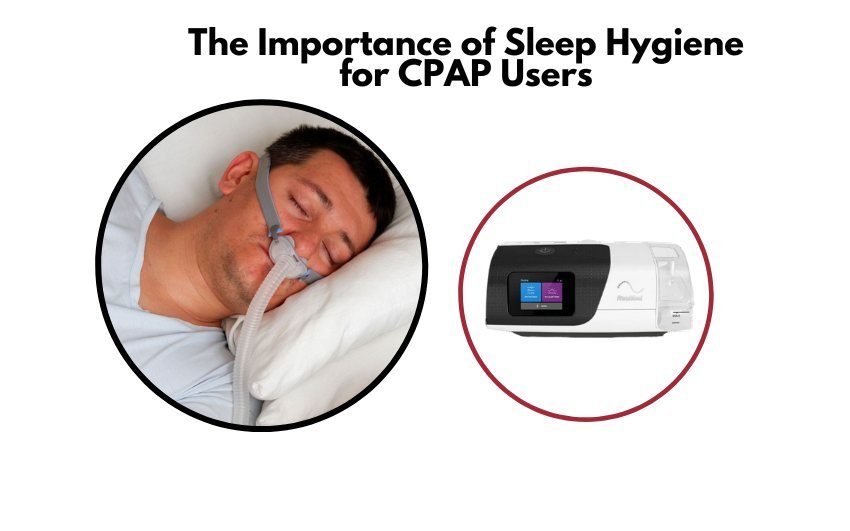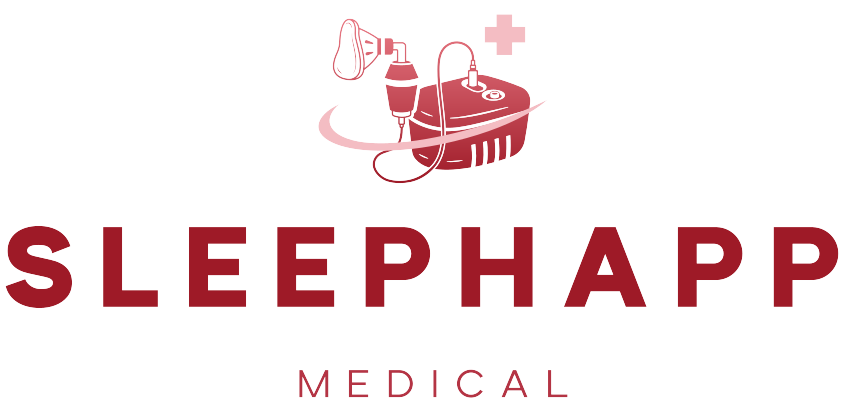The Importance of Sleep Hygiene for CPAP Users
Home » The Importance of Sleep Hygiene for CPAP Users

Table of Contents
Sleep hygiene means good habits that help with better sleep. People with obstructive sleep apnea (OSA) need good sleep hygiene, especially when using a CPAP machine. CPAP machines send air to keep airways open, helping with breathing. This reduces apnea episodes and improves oxygen levels. However, insufficient sleep habits can make CPAP less effective. Users may still feel tired even with treatment. Good sleep hygiene helps CPAP work better. Following the proper habits improves sleep and overall health.
Understanding Sleep Hygiene
Sleep hygiene means good habits for better sleep and health. It includes sleeping at the same time daily, making your bed comfortable, and avoiding things that disturb sleep.
How Bad Sleep Habits Affect CPAP Use
Even if you use CPAP correctly, bad sleep habits can hurt its benefits. Irregular sleep times or frequent waking at night can disturb your sleep. For example, noise or light can wake you up often, reducing deep sleep. This CPAP makes it less helpful. Eating late at night can cause acid reflux. This can make wearing the mask uncomfortable and more challenging to use. (National Sleep Foundation – Sleep Hygiene)
Best Sleep Hygiene Practices for CPAP Users
Maintaining a Consistent Sleep Schedule
Go to bed and wake up at the same time every day. This helps your body follow a natural sleep cycle. A regular schedule makes it easier to fall asleep and stay asleep. CPAP users benefit more when they sleep on time. A steady routine helps the CPAP machine work well. This improves sleep quality and overall health.
Creating a Comfortable Sleep Environment
A good sleep environment helps you sleep better and longer. For deep sleep, keep your room dark, quiet, and cool (60–67°F). Use blackout curtains or an eye mask to block light. Reduce noise with white noise machines, earplugs, or soundproofing. Keep your room cool and fresh for comfort. A good sleep setup stops disturbances and helps keep your CPAP mask on.
Regular CPAP Cleaning and Maintenance
Performance and wellness depend critically on your CPAP being clean. Mold and germs can proliferate on the mask, tubing, and water tank when dirt, moisture, and grease build up there. Ignorance of cleaning could result in allergies, infections, or respiratory issues, therefore aggravating sleep.
Daily mild soap and warm water cleaning of the CPAP mask helps one remain safe. To eliminate minerals and germs, once a week clean the water tank and tubing. Frequent cleaning helps the machine last longer and enhances air flow, thereby maintaining your sleep free from problems.
Avoiding Caffeine and Heavy Meals Before Bed
Coffee, tea, chocolate, and some soft drinks all include caffeine. It keeps the brain active and intensifies difficulty falling asleep. Eating large meals right before bed can aggravate stomach discomfort and acid reflux, which would make sleeping harder. Big meals and coffee both can interfere with CPAP treatment and cause insomnia. Six hours before bed, cut off caffeine if you want better sleep. Eat a simple, light dinner at night. It’s easy-to-digest.( Journal of Clinical Sleep Medicine—Diet and Sleep)
Proper CPAP Mask Fit and Adjustments
A poorly fitted mask can cause air leaks or skin irritation, leading to frequent awakenings. Work with a sleep specialist to adjust straps or try different mask styles (nasal pillows, full-face) for comfort.
Common Challenges and Solutions
Mask Discomfort and Air Leaks
Many CPAP users find their masks uncomfortable, which could lead to air leakage and less effective therapy. A bad-fitting mask could also cause pressure sores, irritate the skin, or feel overly tight, thereby making sleeping more difficult.
Solution:
To cut friction, use soft mask liners or a little silicone-based lubrication. Change the straps to have the mask fitting but not very tight. Look for problems including loose straps or faded cushions. Replace mask parts every 1 to 3 months for a good seal.
Dry Mouth and Stuffy Nose
A CPAP machine can produce a stuffy nose and dry mouth. The airflow parishes your throat and nose. You may find this unsettling and disrupt your sleep.
Solutions:
- Use a CPAP Humidifier. It adds moisture to the air, which helps stop dryness in your mouth and nose.
- Try Saline Spray or Nasal Steroids. These help reduce swelling and clear your nose, making breathing easier.
- Ensure Proper Mask Fit: A loose mask lets air escape. This can cause dry mouth. Adjust your mask or use a full-face mask.
- Stay Hydrated: Drink enough water daily. This helps keep your nose and throat from drying out.
Getting Used to CPAP
Using a CPAP machine may feel strange at first, but you can get used to it over time. Try wearing the mask for short periods during the day. Do this while watching TV, reading, or resting. This helps you feel more comfortable before sleeping with it.
If you feel anxious about using CPAP, Cognitive Behavioral Therapy (CBT) may help. It can reduce fear and negative thoughts about CPAP, making it easier to adjust. With patience and regular use, CPAP can improve sleep and health.
Conclusion
Using a CPAP machine is not enough for good sleep. You also need good sleep habits. Go to bed at the same time every night. Make your bedroom comfortable. Solve any problems with your CPAP machine. These steps help you sleep better and stay healthy. Good habits make CPAP therapy work best.
Sources:
